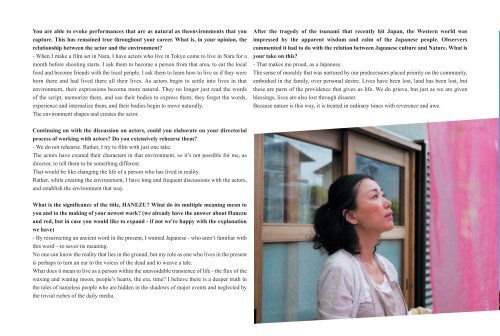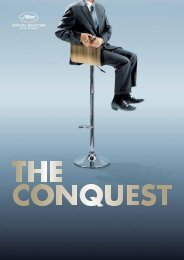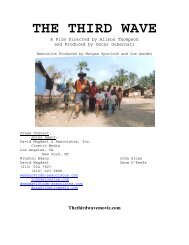English press kit Hanezu No Tsuki - Cannes International Film Festival
English press kit Hanezu No Tsuki - Cannes International Film Festival
English press kit Hanezu No Tsuki - Cannes International Film Festival
You also want an ePaper? Increase the reach of your titles
YUMPU automatically turns print PDFs into web optimized ePapers that Google loves.
You are able to evoke performances that are as natural as theenvironments that you<br />
capture. This has remained true throughout your career. What is, in your opinion, the<br />
relationship between the actor and the environment?<br />
- When I make a film set in Nara, I have actors who live in Tokyo come to live in Nara for a<br />
month before shooting starts. I ask them to become a person from that area, to eat the local<br />
food and become friends with the local people. I ask them to learn how to live as if they were<br />
born there and had lived there all their lives. As actors begin to settle into lives in that<br />
environment, their ex<strong>press</strong>ions become more natural. They no longer just read the words<br />
of the script, memorize them, and use their bodies to ex<strong>press</strong> them; they forget the words,<br />
experience and internalize them, and their bodies begin to move naturally.<br />
The environment shapes and creates the actor.<br />
Continuing on with the discussion on actors, could you elaborate on your directorial<br />
process of working with actors? Do you extensively rehearse them?<br />
- We do not rehearse. Rather, I try to film with just one take.<br />
The actors have created their characters in that environment, so it’s not possible for me, as<br />
director, to tell them to be something different.<br />
That would be like changing the life of a person who has lived in reality.<br />
Rather, while creating the environment, I have long and frequent discussions with the actors,<br />
and establish the environment that way.<br />
What is the significance of the title, HANEZU? What do its multiple meaning mean to<br />
you and to the making of your newest work? (we already have the answer about <strong>Hanezu</strong><br />
and red, but in case you would like to expand - if not we're happy with the explanation<br />
we have)<br />
- By resurrecting an ancient word in the present, I wanted Japanese - who aren’t familiar with<br />
this word—to savor its meaning.<br />
<strong>No</strong> one can know the reality that lies in the ground, but my role as one who lives in the present<br />
is perhaps to turn an ear to the voices of the dead and to weave a tale.<br />
What does it mean to live as a person within the unavoidable transience of life - the flux of the<br />
waxing and waning moon, people’s hearts, the era, time? I believe there is a deeper truth in<br />
the tales of nameless people who are hidden in the shadows of major events and neglected by<br />
the trivial riches of the daily media.<br />
After the tragedy of the tsunami that recently hit Japan, the Western world was<br />
im<strong>press</strong>ed by the apparent wisdom and calm of the Japanese people. Observers<br />
commented it had to do with the relation between Japanese culture and Nature. What is<br />
your take on this?<br />
- That makes me proud, as a Japanese.<br />
The sense of morality that was nurtured by our predecessors placed priority on the community,<br />
embodied in the family, over personal desire. Lives have been lost, land has been lost, but<br />
these are parts of the providence that gives us life. We do grieve, but just as we are given<br />
blessings, lives are also lost through disaster.<br />
Because nature is this way, it is treated in ordinary times with reverence and awe.

















